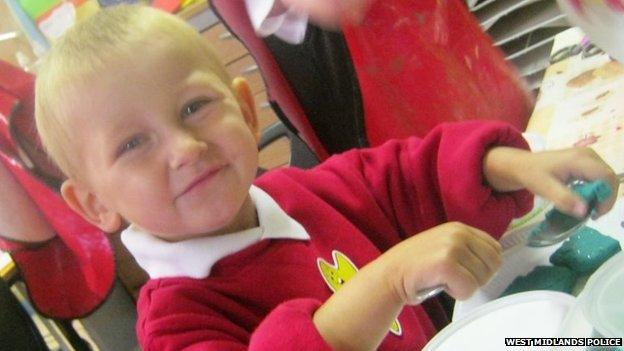Daniel Pelka: Do serious case reviews work?
- Published

Daniel Pelka died from a head injury in March 2012
A serious case review has said agencies missed opportunities to help four-year-old Daniel Pelka, who was murdered by his mother and her partner in Coventry. But how successful are such reviews in preventing similar cases?
Baby P, Victoria Climbie, Khyra Ishaq and now Daniel Pelka. Each case an example of shocking child cruelty, which resulted in inquiries, reports and recommendations.
Khalid Mahmood, Labour MP for Birmingham Perry Barr, is one of many who feels they have simply not worked.
His experience is based on, among others, the case of seven-year-old Khyra Ishaq, who starved to death in Birmingham in 2008.
"There's no accountability or responsibility. The way it is done is to protect professionals," he said.
"It's a defence mechanism. You keep hearing 'we've learned lessons', but the same things keep coming up."
Hundreds of such reports have been compiled in England and Wales over the last decade and more launched after a child's death or serious injury is thought to have been caused by neglect or abuse.
In the past, common themes in serious case reviews have included poor communication between agencies and failings in assessments and decision-making. Even some supporters of the system feel the recurrence of common failings is a "worrying" factor.
"Serious case reviews work well at a local level," David Tucker, head of policy at the NSPCC said.
"The difficulty is that a lot of the same learning points come up again and again."
"Communication is one of the most perennial themes," Annie Hudson, chief executive of The College of Social Work said.
"I can understand why the media and the public feel exasperated and say 'Why can't you get this right?'."
One man who has read more serious case reviews than most is Dr Peter Sidebotham, who heads a research team at the University of Warwick studying reviews for common child abuse risk factors.
He said while reviews often helped local agencies improve their services, "creative thinking" by government was needed to ensure the lessons were learned elsewhere in the country.
One of the main problems was busy social workers being unable to grasp the sheer amount of information contained in them, he said.
Between 2009 and 2011, such reviews made an average of 46 recommendations each and action plans alone could run to 40 pages.
"Rise in caseloads mean you are dealing with the cases in front of you, rather than learning," Dr Sidebotham added.
Historically, the very format of serious case reviews, published in isolation by individual safeguarding boards, has also made it difficult for professionals across the country to learn from others' mistakes.
"At times there has been very little organisational learning, even within the same organisation, but certainly across other organisations," said Bridget Robb, chief executive of the British Association of Social Workers (BASW).
She said managers often did not pass on the findings of such reviews to social workers.
A survey by the association suggested 25% never saw a serious case review by their own local authority and 36% had never seen the actual Peter Connelly (Baby P) report, perhaps the most high-profile of all.
The survey, of 238 social workers, found 67% were "only sometimes" able to read recommendations from reports, and 17% never do. Of the respondents, 97% said they would like to see an online database of all reviews so they could access them easily.
Ms Robb said the number of agencies involved - combined with the workload - also made it difficult for social workers to communicate effectively with other agencies.
However, the Daniel Pelka report is one of the first to be carried out under a new serious case review system introduced in April.
It is designed to offer safeguarding boards greater flexibility and focus more on the child.
"There's more of a focus on underlying systems, rather than individual failings," Dr Sidebotham said. "Hopefully it make reports more positive and proactive, rather than reactive."
Andrew Webb, president of the Association of Directors of Children's Services, said one of the biggest tests for the new reviews would be whether they drove improvement in professional culture, making conversations between social workers, teachers, GPs, health visitors, police and others the norm.
Reviews in the past, he said, had been too inflexible and bureaucratic, with a focus on satisfying Ofsted guidelines, rather than improving actual practice.
"They could have been really insightful pieces of work but that could get lost in the SCR process," said Mr Webb.
"Sometimes, we would lose the opportunity to see how the system could be improved. After all you can follow the guidelines, but still make a bad decision and you can make a good decision without following procedure."
The Department for Education (DfE) refused to comment on the success of past serious case reviews.
It said the new system was designed to improve the quality of such reviews across the country and avoid mistakes being repeated.
The appointment of a chief social worker, as well as the creation of an independent panel of experts to advise safeguarding boards, would help provide improved standards across the country, the DfE claimed.
- Published16 September 2013
- Published2 August 2013
- Published12 September 2013
- Published27 July 2010
- Published26 October 2010
- Published16 July 2013